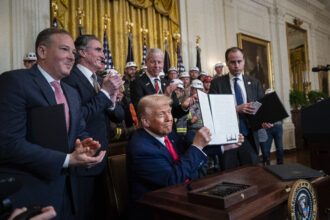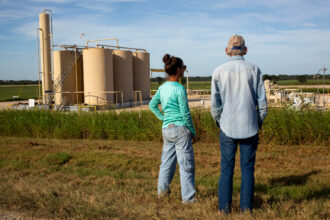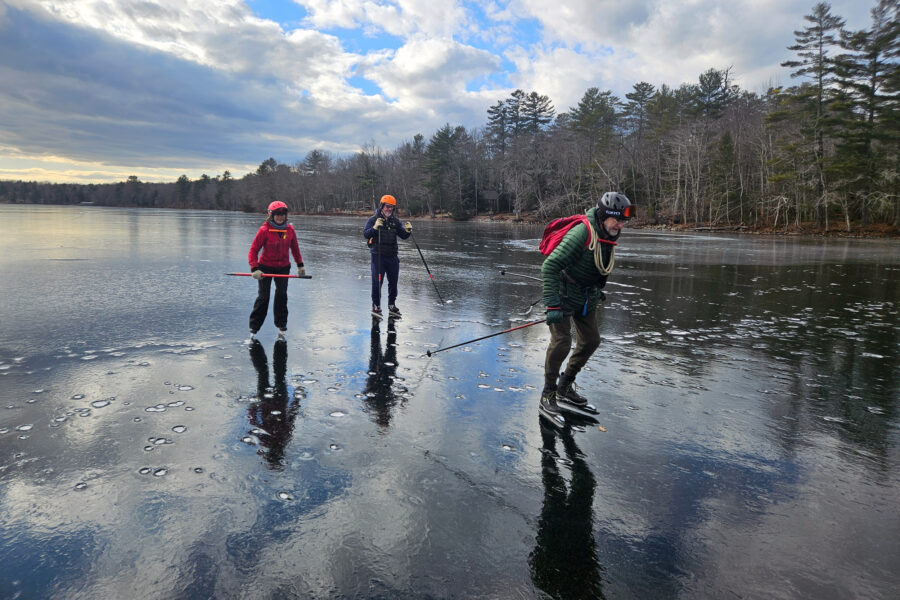InsideClimate News has won two top honors from the Society of American Business Editors and Writers for its investigations into the ways the fossil fuel industry guards its profits and prominence at the expense of ordinary Americans and tactics it uses to fight environmental activism. It also won an honorable mention for reporting on past violations by a company planning to drill in the Arctic.
Choke Hold, a seven-part series that chronicles the fossil fuel industry’s fight against climate policy, science and clean energy won “best in business” in the health and science category and honorable mention in the explanatory category. The series was written by Neela Banerjee, David Hasemyer, Marianne Lavelle, Robert McClure and Brad Wieners, and was edited by Clark Hoyt.
ICN reporter Nicholas Kusnetz won first place in the government category for his article on how industry lawyers are attempting to use racketeering laws to silence environmental activists.
Reporter Sabrina Shankman was awarded honorable mention in the investigative category for an article examining the history of regulatory violations by Hilcorp, an oil and gas company that is planning a major drilling project off the coast of Alaska.
Exposing Industry’s Choke Hold Tactics
Collectively, the Choke Hold stories explain how industry has suffocated policies and efforts that would diminish fossil fuel extraction and use, despite the accelerating impacts on the climate. The stories were built around narratives of ordinary Americans suffering the consequences. Three articles from the Choke Hold series were submitted for the awards, the maximum allowed.
The judges praised the Choke Hold entry for explaining “how the U.S. government whittled away protections for average Americans to interests of large fossil-fuel corporations.” The series included “reporting on how a scientific report was tweaked to justify a provision of the Energy Policy Act that bars the Environmental Protection Agency from safeguarding drinking water that may be contaminated by fracking, and how coal mining depleted aquifers.”
The RICO Strategy
Kusnetz’s reporting explained how logging and pipeline companies are using a new legal tactic under racketeering laws, originally used to ensnare mobsters, to accuse environmental advocacy groups that campaigned against them of running a criminal conspiracy. His story examines how these under-the-radar cases could have a chilling effect across activist movements and on First Amendment rights more broadly.
The judges said Kusnetz’s “compelling narrative, starting with questionable characters arriving unannounced in a person’s driveway for reasons unknown, distinguished this entry from the pack. The story neatly wove a novel legal strategy in with the larger fight being waged against climate groups in a way that set the table for the wars to come in this arena.”
The 23rd annual awards drew 986 entries across 68 categories from 173 organizations. The winners will be honored in April in Washington, D.C.
About This Story
Perhaps you noticed: This story, like all the news we publish, is free to read. That’s because Inside Climate News is a 501c3 nonprofit organization. We do not charge a subscription fee, lock our news behind a paywall, or clutter our website with ads. We make our news on climate and the environment freely available to you and anyone who wants it.
That’s not all. We also share our news for free with scores of other media organizations around the country. Many of them can’t afford to do environmental journalism of their own. We’ve built bureaus from coast to coast to report local stories, collaborate with local newsrooms and co-publish articles so that this vital work is shared as widely as possible.
Two of us launched ICN in 2007. Six years later we earned a Pulitzer Prize for National Reporting, and now we run the oldest and largest dedicated climate newsroom in the nation. We tell the story in all its complexity. We hold polluters accountable. We expose environmental injustice. We debunk misinformation. We scrutinize solutions and inspire action.
Donations from readers like you fund every aspect of what we do. If you don’t already, will you support our ongoing work, our reporting on the biggest crisis facing our planet, and help us reach even more readers in more places?
Please take a moment to make a tax-deductible donation. Every one of them makes a difference.
Thank you,













